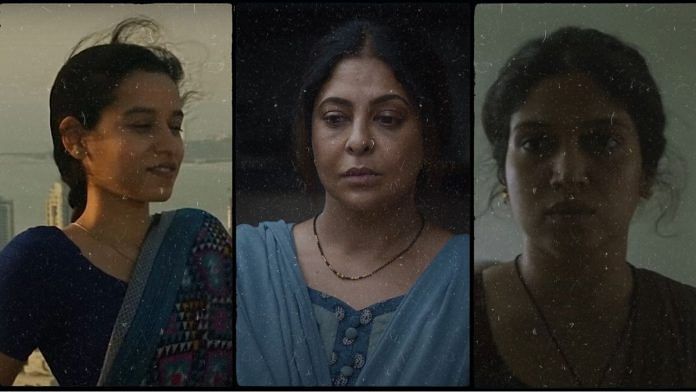For long, South Asian films have resorted to portraying characters of domestic help as lopsided and stilted. From Kantaben in the 2003 blockbuster Kal Ho Naa Ho to Sooraj Barjatya’s 1994 film Hum Aapke Hain Koun!, female domestic workers have only served as agents of slapstick comedy. Seen as helpless vassals, they have been robbed of strength and agency to drive a story—their story—with their circumstances fetishised and their struggles ignored.
While there is a considerable change in the depiction of modern Indian women in Bollywood from helpless housewives to tequila popping privileged women with personal autonomy, women on the margins are still approached in a perfunctory and stereotypical manner. Films like Prashant Nair’s Delhi in a Day (2011), while trying to shed light on the condition of domestic help in India, still victimises them.
But lately, there’s been a change. Suresh Triveni’s Jalsa, Zoya Akhtar’s segment in Lust Stories (2018) and Rohena Gera’s Sir (2018) have brought a different interpretation of the domestic worker character to the screens. They’re unapologetically human, taking the centre stage and breaking the ‘norms’ that have previously held them back.
Also Read: Guns, violence, revenge — Mothers in Bollywood are changing from sanskari to fiery
Bollywood films and domestic workers
Films like Jalsa have posed an interesting extension of the trope of the ‘devoted’ domestic worker. Shefali Shah’s Ruksana isn’t your token ‘Daijaan’ from Karan Johar’s Kabhi Khushi Kabhie Gham (2001). Her bond with Ayush, the son of Vidya Balan’s character Maya, is an important vehicle that drives the narrative forward.
Ruksana’s quiet obedience and love for Ayush forces Maya to confront her inner demons. Writer Prajwal Chandrashekar’s conception of Ruksana is such that it enables the audience to support and understand her struggle for dignity and justice instead of feeling sorry for her. Maya is lost without Ruksana’s forgiveness, and it shows how important and powerful the character is.
Even Akhtar redeems herself with her short in Lust Stories. Bhumi Pednekar essays the role of a domestic worker who falls in love with her employer — reflected vividly in how she cares for him in his house. There is something cathartic about seeing her perform her daily chores, mainly because the process is so reflective of her love for Ajit (Neil Bhoopalam).
Rohena Gera’s Sir is perhaps the most powerful re-imagination of the character of a domestic worker. Tilotamma Shome’s breakthrough film, Sir explores the theme of love between a Maharashtrian domestic worker, Ratna, and her employer, Ashwin (Vivek Gomber). What’s refreshing about Sir is its focus on Ratna, and the milestones she crosses—everyone else is a supporting act. Ratna is more than a caregiver—a woman with real, tangible dreams and ambitions that she continues to work on. While the two communicate in few words, the viewer feels myriad of emotions.
Although the theme of class divide and poverty is apparent, Sir does more than just linger on those aspects—it explores the humane individualism of its central characters, and focuses on Ratna’s right to love, that too her employer.
Also Read: Lagaan to Jhund, how does India pick sports films? Dalit stories are starting ‘second innings’
Southeast Asian depiction
When we move further to Southeast Asia, it is impossible to not mention underrated gems like Ilo Ilo—a 2013 slice-of-life film by Anthony Chen. Set in 1990s Singapore, the film tells the story of Terry (Angeli Bayani), a Filipina domestic worker who is hired by an inherently dysfunctional working-class family. She is also left in charge of their brattish, obnoxious 10-year-old son, Jiale.
The film could have steered in any direction—a possible affair between Terry and the husband (Tian Wen Chen), or a deep focus on Terry’s tryst with poverty. Instead, it chooses to focus on the endearing bond between Terry and Jiale, and her never-say-never demeanour—she smiles despite struggles and hustles to make ends meet. She finds strength and purpose in managing Jiale, but refuses to be bullied by him, or his hypocritical family.
‘Why you do that to me, huh? Why you do that to me? I don’t care if you like me or not. You don’t like, I don’t care. But your mum, she employed me. I’m here to do my work properly. I am your maid, but I didn’t come here to be bullied,’ she says at one point.
It is refreshing to see a small canon of films challenge an elitist and passé perception of feminism in cinema. They portray domestic workers as human beings with power, agency and strength instead of ‘othering’ them, or overplaying their poverty to please a white gaze. This remarkable shift to realistic, inclusive cinema seems like the need of the hour. There’s hope that more filmmakers will explore different facets of a domestic help’s life, instead of regurgitating the same old tropes.
Views are personal.
(Edited by Srinjoy Dey)



